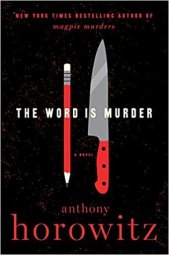 This fictional mystery, written in nonfiction true crime style, will have readers boggled until the very last page.
This fictional mystery, written in nonfiction true crime style, will have readers boggled until the very last page.
International bestselling author Anthony Horowitz is approached by ex-Detective Inspector Daniel Hawthorne, formerly of the Metropolitan Police, with a proposition. Hawthorne, now a private consultant, is a bit strapped for cash (“There just aren’t enough people getting murdered.”) and wants Horowitz to follow him around and write a book about him, splitting the profit fifty-fifty. He even has the title picked out: Hawthorne Investigates. Horowitz has just finished his newest novel, House of Silk, and is at somewhat of a loose end, so he agrees.
Hawthorne has just started a new case: Diana Cowper, a healthy woman in her sixties, spent the afternoon at Cornwallis and Sons Funeral Parlor arranging her funeral. Six hours later she was murdered in her home. As Horowitz follows Hawthorne around the reader becomes familiar with the case and the suspects but Hawthorne himself, the supposed focus of the novel, remains inscrutable. The reader – and Horowitz – know little of Hawthorne’s life, his history, or even his reasoning for the direction he takes the investigation. The reader must rely instead on Horowitz’s account. Fortunately, Horowitz is observant, records conversations, and takes detailed notes. Buried in these notes, in all of the information relayed through interviews and research, is the identity of Diana Cowper’s murderer. Who will realize it first, Hawthorne or Horowitz…or the murderer?
In Horowitz’s 2016 novel The Magpie Murders Horowitz played with the framework of the mystery story, writing a novel within a novel. The Word is Murder is a fictional novel, but within its pages Horowitz has muddled the line between fiction and nonfiction, weaving factual information about his own life and career into the fictional investigation that he and (mostly) Hawthorne conduct. The character development is also unusual. Hawthorne is a private, secreted individual, which frustrates Horowitz and makes it difficult for the reader to get a handle on him. He’s fleshed out almost against his will. The narrator is Horowitz, and sometimes it almost feels as if he’s written a memoir instead of a murder mystery. But ultimately the main character is the mystery itself, with the actual victim and the people Hawthorne interviews mere secondary characters, interesting and realistic, but there to move the plot along rather than engage the reader.
The plot of The Word is Murder is more cerebral than action oriented, and the blur of fiction and reality is somewhat mind bending. This initially made it difficult to fully immerse myself in the story. Once I stopped trying to decipher what I thought was true versus what the author likely made up I enjoyed the story much more. The pacing of the novel was good and it kept my attention.
This is a very different detective novel. Readers who enjoy murder mysteries and detective stories will likely gobble it up. It will help to be somewhat familiar with Anthony Horowitz, but it isn’t necessary for overall enjoyment of the book.
